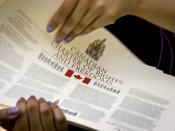Immanuel Kant's moral philosophy is very structured and rule based, with no room for exceptions. His main principle for his ethical philosophy is the Categorical Imperative. There are two principles that form the basis of Kant's ethics. They are: "act only on that maxim that you can will as a universal law" and, "always treat humanity, whether in your own person or that of another, never simply as a means but always at the same time as an end" (2004, p. 70-71)." These principles are meant to apply equally to everyone, and accommodate no exceptions. In the Liberal modern state, all of its citizens are seen as equals. But what about minority recognition and rights are they being quashed by the liberal system that is designed to equalize everyone? To be consistent, the discussion will examine a modern liberal nation state: Canada. Canada fits the standard of a Liberal society because of its equality policy specified in their constitution:
Every individual is equal before and under the law and has the right to the equal protection and equal benefit of the law without discrimination and, in particular, without discrimination based on race, national or ethnic origin, colour, religion, sex, age or mental or physical disability.
By examining The Canadian Charter of Rights and Freedoms, The Youth Criminal Justice Act and political immunity in Canada, the course of the discussion will reveal liberalism is a dichotomy. The liberal system asserts everyone as equal but at the same time focuses legislation on promoting minority rights. Furthermore, the discussion will describe how Kant would agree with this argument.
First, political immunity gives minorities in Canada rights above those of other citizens. In 2001, Russian diplomat Andrei Knyasev, a repeat drunk driving offender, ran over and killed a woman and seriously injured her friend...


